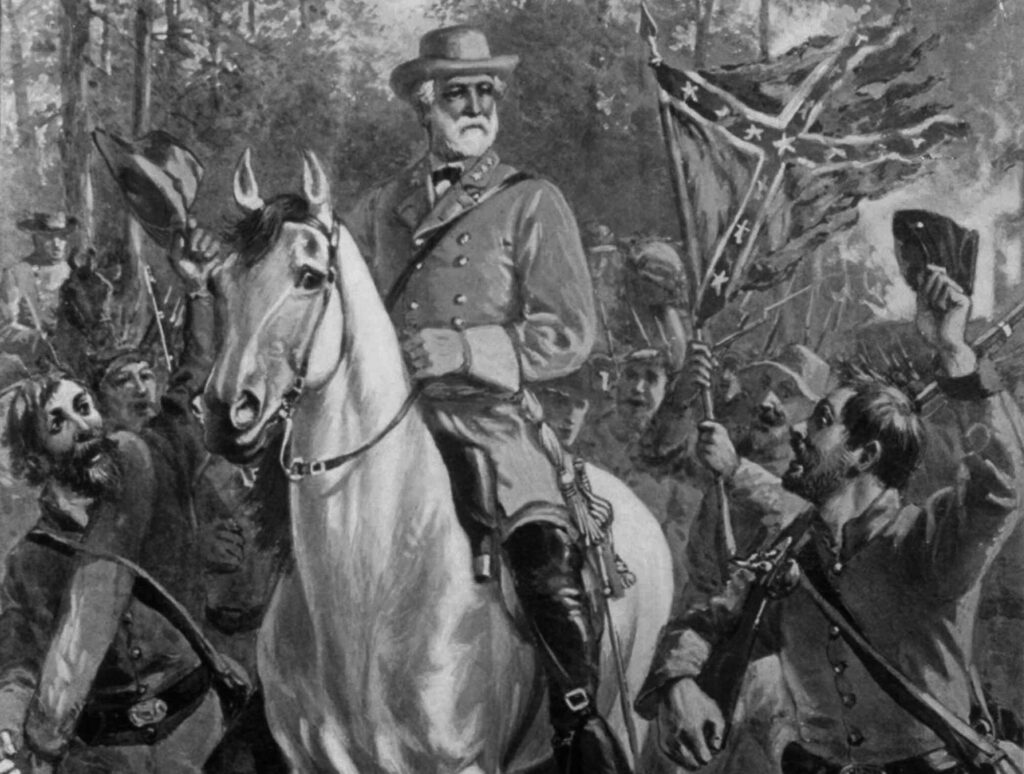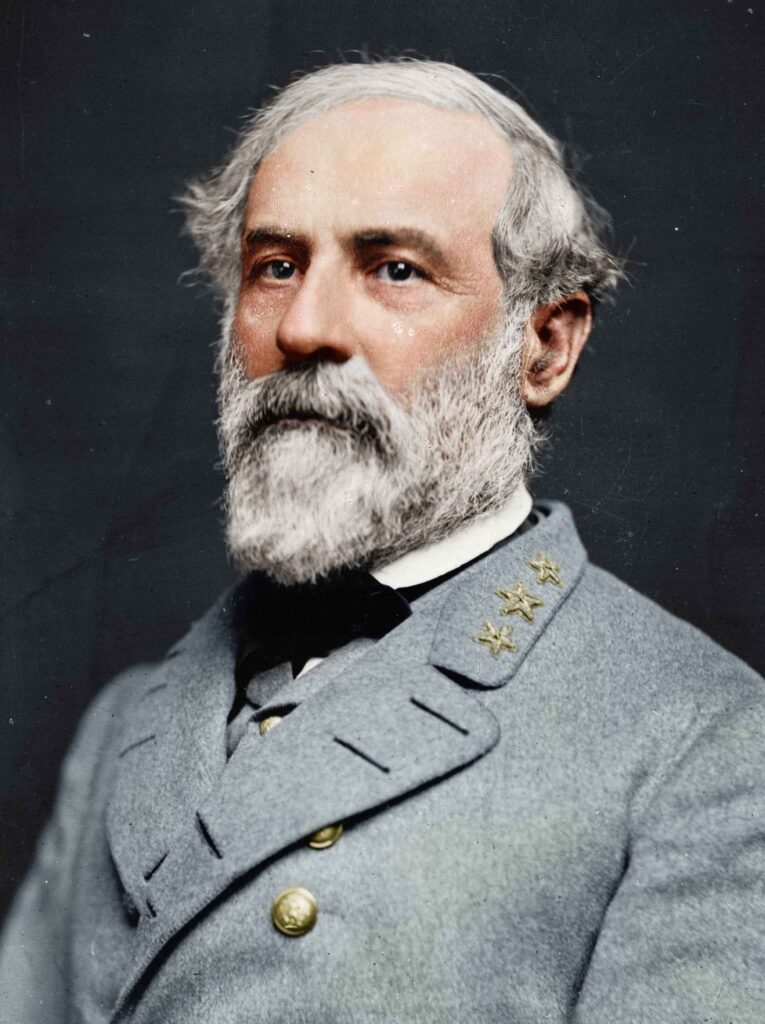Robert E. Lee was a prominent American military officer best known for commanding the Confederate Army of Northern Virginia during the American Civil War. Born on January 19, 1807, at Stratford Hall in Westmoreland County, Virginia, he became a central figure in American history due to his leadership during the war and his complex legacy in the post-war era.
Early Life and Education
Robert E. Lee was the son of Henry “Light-Horse Harry” Lee III, a Revolutionary War hero, and Anne Hill Carter Lee. Despite his father’s esteemed military reputation, the Lee family faced financial difficulties due to failed investments, leading to a modest upbringing for young Robert. In 1811, the family relocated to Alexandria, Virginia, seeking better opportunities and stability.
Demonstrating academic excellence and a keen interest in military service, Lee secured an appointment to the United States Military Academy at West Point in 1825. His tenure at the academy was marked by outstanding performance; he graduated in 1829, ranking second in his class. Notably, Lee completed his four years at West Point without incurring any demerits, a rare achievement that underscored his discipline and commitment.
Personal Life and Family
In 1831, Robert E. Lee married Mary Anna Randolph Custis, the great-granddaughter of Martha Washington. The union not only connected Lee to one of Virginia’s most illustrious families but also brought him to Arlington House, the Custis family estate, which would later become a significant historical landmark.

The couple was blessed with seven children:
- George Washington Custis Lee (1832–1913): Followed in his father’s footsteps, serving as a Confederate general and later becoming the president of Washington and Lee University.
- Mary Custis Lee (1835–1918): Known for her extensive travels and dedication to preserving her family’s legacy.
- William Henry Fitzhugh Lee (1837–1891): Also known as “Rooney,” he served as a cavalry officer in the Confederate Army and later became a planter and politician.
- Anne Carter Lee (1839–1862): Tragically passed away at a young age due to illness.
- Eleanor Agnes Lee (1841–1873): Remembered for her writings and deep familial bonds.
- Robert E. Lee Jr. (1843–1914): Served as a soldier in the Confederate Army and later pursued a career in business and writing.
- Mildred Childe Lee (1846–1905): The youngest of the Lee children, she remained unmarried and dedicated much of her life to her family.
The Lee family valued education, faith, and a sense of duty, principles that were evident in Robert E. Lee’s personal and professional life.
Detailed Biography Table
| Full Name | Robert Edward Lee |
|---|---|
| Date of Birth | January 19, 1807 |
| Place of Birth | Stratford Hall, Westmoreland County, VA |
| Date of Death | October 12, 1870 |
| Place of Death | Lexington, Virginia |
| Parents | Henry “Light-Horse Harry” Lee III (father), Anne Hill Carter Lee (mother) |
| Spouse | Mary Anna Randolph Custis |
| Children | George Washington Custis Lee, Mary Custis Lee, William Henry Fitzhugh Lee, Anne Carter Lee, Eleanor Agnes Lee, Robert E. Lee Jr., Mildred Childe Lee |
| Education | United States Military Academy at West Point |
| Military Service | United States Army (1829–1861), Confederate States Army (1861–1865) |
| Height | Approximately 5 feet 10 inches (178 cm) |
| Net Worth (2024) | Not applicable; Lee passed away in 1870 |
Military Career
After graduating from West Point, Lee was commissioned as a brevet second lieutenant in the Corps of Engineers. His early assignments involved supervising the construction and maintenance of military installations, where he showcased his engineering prowess and leadership skills.
During the Mexican-American War (1846–1848), Lee served as a captain under General Winfield Scott. His reconnaissance and engineering expertise were instrumental in several key battles, earning him brevet promotions and recognition for his bravery and strategic acumen.

In 1852, Lee returned to West Point, this time as its superintendent. His tenure was marked by efforts to modernize the curriculum and infrastructure, reflecting his commitment to advancing military education.
By 1855, Lee transitioned to the cavalry, taking on frontier duties in Texas. These years exposed him to the complexities of military leadership in diverse terrains and against various adversaries.
As tensions between the Northern and Southern states escalated, Lee faced a profound personal and professional dilemma. Despite his loyalty to the Union, his deep-rooted ties to Virginia influenced his decision to resign from the U.S. Army in April 1861, following Virginia’s secession.
Assuming command of the Confederate Army of Northern Virginia, Lee’s strategic brilliance became evident in battles such as the Second Battle of Bull Run, Fredericksburg, and Chancellorsville. However, his aggressive tactics also led to significant losses, most notably at the Battle of Gettysburg in 1863.
In 1865, as the Confederacy’s resources dwindled and Union forces advanced, Lee was appointed General-in-Chief of Confederate forces. Recognizing the futility of continued conflict, he surrendered to General Ulysses S. Grant at Appomattox Court House on April 9, 1865, effectively ending the Civil War.
Post-War Life and Legacy
Following the war, Lee was paroled and returned to civilian life. In 1865, he accepted the position of president at Washington College in Lexington, Virginia. Under his leadership, the institution expanded its curriculum and infrastructure, laying the foundation for what would become Washington and Lee University.
Robert E. Lee passed away on October 12, 1870, in Lexington, Virginia. His death marked the end of an era, but debates about his legacy persist. While some view him as a symbol of Southern heritage and honor, others critique his role in leading the Confederate forces and his association with the institution of slavery. This dichotomy has led to ongoing discussions about the commemoration of his likeness in public spaces and the reevaluation of his place in American history.
In summary, Robert E. Lee’s life was a tapestry of duty, leadership, and complexity. From his formative years in Virginia to his pivotal role in the Civil War and his contributions to education in his later years, Lee remains a figure of significant historical interest, embodying the nuanced narratives of America’s past.
Social Media Accounts
As Robert E. Lee lived in the 19th century, he did not have any social media accounts.
Latest News
As of January 20, 2025, Robert E. Lee remains a focal point in discussions about historical memory and public commemoration. Recent debates have intensified regarding the presence of Confederate monuments, with particular attention to statues of Lee. Some communities advocate for the removal or relocation of these monuments, viewing them as symbols of racial oppression, while others argue for their preservation as integral parts of history. This ongoing discourse reflects a broader societal effort to reconcile the complexities of the past with contemporary values.
Physical Appearance
Robert E. Lee was noted for his dignified and commanding presence. Standing approximately 5 feet 10 inches tall (178 cm), he had a lean build. In his later years, he sported a full gray beard, which, along with his uniform, became iconic representations of his image.
Net Worth as of 2024
Assessing Robert E. Lee’s net worth as of 2024 is not applicable, as he passed away in 1870. During his lifetime, Lee’s wealth was modest. After the Civil War, he served as the president of Washington College (now Washington and Lee University) in Lexington, Virginia, until his death.
Legacy
Robert E. Lee’s legacy is multifaceted and continues to be the subject of extensive analysis and debate. While some view him as a symbol of Southern heritage and honor, others critique his role in leading the Confederate forces and his association with the institution of slavery. This dichotomy has led to ongoing discussions about the commemoration of his likeness in public spaces and the reevaluation of his place in American history.
Frequently Asked Questions About Robert E. Lee
1. Who was Robert E. Lee?
Robert E. Lee was a Confederate general best known for leading the Army of Northern Virginia during the American Civil War. He played a central role in key battles and is remembered as a symbol of the Confederate cause.
2. Where was Robert E. Lee born?
Lee was born on January 19, 1807, at Stratford Hall Plantation in Westmoreland County, Virginia.
3. What is Robert E. Lee’s connection to Arlington National Cemetery?
Lee’s family estate, Arlington House, was confiscated during the Civil War and later became the site of Arlington National Cemetery, honoring soldiers who served in the U.S. military.
4. Why did Robert E. Lee join the Confederate Army?
Although Lee initially opposed secession, his deep loyalty to his home state of Virginia compelled him to resign from the U.S. Army and accept a leadership role in the Confederacy after Virginia seceded.
5. What were Robert E. Lee’s major accomplishments during the Civil War?
Lee is known for his strategic brilliance, particularly in battles such as Chancellorsville, Fredericksburg, and the Second Battle of Bull Run. However, he also faced significant losses, most notably at Gettysburg.
6. What was Robert E. Lee’s role after the Civil War?
After the Civil War, Lee became the president of Washington College in Lexington, Virginia, where he worked to promote reconciliation and education. The college was later renamed Washington and Lee University in his honor.
7. What is the controversy surrounding Robert E. Lee today?
Lee remains a contentious figure due to his leadership of the Confederate forces and association with the defense of slavery. Debates persist about the removal or preservation of his statues and other monuments.
8. How is Robert E. Lee remembered in American history?
Lee is remembered as a skilled military leader and a symbol of Southern heritage by some, while others critique his role in the Confederacy and its ties to slavery, highlighting the complexity of his legacy.
9. When and where did Robert E. Lee die?
Robert E. Lee died on October 12, 1870, in Lexington, Virginia, after suffering a stroke.
10. Are there any books or films about Robert E. Lee?
Yes, numerous biographies, historical analyses, and documentaries have been created about Lee. Some notable works include “Robert E. Lee: A Biography” by Emory M. Thomas and films like Gettysburg (1993).
For more engaging biographies of influential figures, explore Fabio Silva’s inspiring journey on Top Trends Bio.
Learn about prominent personalities in current events by reading Jill Biden’s comprehensive biography on Biography Craft.



